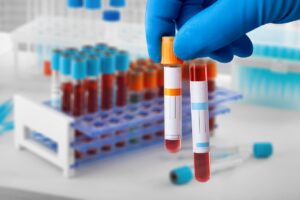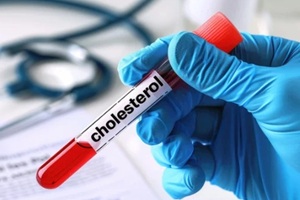 Grasping the numbers from your cholesterol screening results is paramount to the health of your cardiac system. The lipid panel blood test ordered during routine cholesterol screening provides insight into specific biomarkers that indicate the risk of developing cardiovascular disease.
Grasping the numbers from your cholesterol screening results is paramount to the health of your cardiac system. The lipid panel blood test ordered during routine cholesterol screening provides insight into specific biomarkers that indicate the risk of developing cardiovascular disease.
This article will explain what important biomarkers are, how they are used in cholesterol screening, and what your results signify.
What Are Biomarkers?
Biomarkers are measurable biological characteristics that provide objective information about normal or pathogenic processes in the body. They allow medical professionals to screen for disease risk, make diagnoses, select appropriate therapies, and monitor disease progression or response to treatment.
Common biomarkers used in cholesterol screening include:
- Total cholesterol
- LDL cholesterol
- HDL cholesterol
- Triglycerides
These biomarkers are quantified through a lipid panel test to determine your risk of atherosclerosis, heart attack, stroke, and related conditions.
Total Cholesterol
This biomarker reflects the sum of all the cholesterol content traveling in your bloodstream. Total cholesterol levels categorize risk as:
- Desirable: Under 200 mg/dL
- Borderline High Risk: 200-239 mg/dL
- High Risk: 240 mg/dL and above
If you have a higher level of total cholesterol, you are more likely to have fatty deposits known as plaque building up in your artery walls. This plaque narrows passages, reducing blood flow. It also ruptures easily, causing blood clots leading to heart attack or stroke.
LDL Cholesterol
LDL is an acronym for low-density lipoprotein cholesterol. This biomarker indicates the main transporter shuttling cholesterol to the body’s tissues.
High LDL cholesterol accelerates dangerous plaque accumulation in arteries feeding the heart and brain. Levels classify risk as:
 Ideal: Under 100 mg/dL
Ideal: Under 100 mg/dL- Near-Ideal: Between 100 and 129 mg/dL
- Borderline High: Starting at 130 up to 159 mg/dL
- High: 160-189 mg/dL
- Very High: Equal to and above 190 mg/dL
For patients already diagnosed with heart disease, an LDL cholesterol goal of under 70 mg/dL applies instead, which can be achieved via cholesterol-lowering medications.
HDL Cholesterol
HDL represents high-density lipoprotein cholesterol. It acts as the transport mechanism, taking extra cholesterol from tissues back to your liver for elimination.
Higher HDL cholesterol levels protect your heart by reversing cholesterol buildup. Categories include:
- Poor: Under 40 mg/dL
- Better: 40-49 mg/dL
- Best: 50 mg/dL and above
Low HDL also raises heart disease risks similar to high LDL cholesterol, though genetics also influence your HDL cholesterol range.
Triglycerides
The body stores excess calories from foods as triglycerides circulating in the blood until needed for energy. Levels indicate heart risks as:
- Normal: Under 150 mg/dL
- Borderline High: 150-199 mg/dL
- High: 200-499 mg/dL
- Very High: Over 500 mg/dL
Cholesterol Screening Implications
The lipid panel biomarkers from routine cholesterol screening provide your doctor with objective data to gauge your statistical odds of encountering heart disease in the coming decades. Patients facing only minimal risks may just need occasional testing.
Those revealing borderline or high-risk biomarker results will require more vigilant monitoring and application of preventative therapies. These can include:
- Heart-healthy lifestyle changes
- Prescription cholesterol medications
- Nutritional supplementation where appropriate
 Repeating cholesterol screening every five years provides updated biomarker trends over time. Worsening values may necessitate more intensive therapy to halt advancing disease processes before irreversible damage or events occur.
Repeating cholesterol screening every five years provides updated biomarker trends over time. Worsening values may necessitate more intensive therapy to halt advancing disease processes before irreversible damage or events occur.
On the other hand, optimal biomarker levels give reassurance that current management strategies are effectively curtailing risks. Discuss all biomarker test results thoroughly with your clinician to understand the implications and next steps.
What Influences Biomarker Levels?
Both modifiable and non-modifiable factors interplay to determine biomarker ranges in your cholesterol screening.
Non-Modifiable Factors
Elements outside your control exert substantial effects on lipid panel biomarkers, mainly:
- Age: Values gradually rise as you get older.
- Sex: Guidelines differ slightly between men and women.
- Genetics: Family histories of early cardiac disease or events also raise your personal risks significantly despite diet, fitness, weight, or other factors.
Modifiable Targets
You have the power to move the needle on biomarkers to safer zones through lifestyle measures and medications:
- Diet: Limit cholesterol, saturated fats, trans fats, sodium, and added sugars while emphasizing protective mono/polyunsaturated fats, fiber, lean proteins, fruits, vegetables, and whole grains.
- Weight: Excess pounds exacerbate the production and absorption of cholesterol from foods. Carrying extra belly weight also pumps out proteins that lower HDL.
- Exercise: Aerobic and strength training increase HDL while reducing LDL and triglycerides. Even light activity helps versus a sedentary routine.
- Smoking: Chemicals in cigarettes and vaping constrict arteries, attack heart tissue, raise clot risks, lower HDL, and impair cholesterol metabolism. Quitting is paramount.
- Stress: Chronic stress over-activates pathways, flooding the bloodstream with artery-damaging free radicals, cholesterol, triglycerides, and inflammatory compounds. Relax!
- Medications: Statins, niacin, fibrates, and prescription fish oils improve lipid panel biomarkers. Nutritional supplements can also assist when appropriate.
Follow Clinician Guidance
 With knowledge of how various factors influence your biomarker levels, you can pinpoint lifestyle measures apt to offer the most improvement if medication therapy isn’t yet needed. Your doctor will guide you on suitable dietary changes, activity goals, target weight loss if overweight, smoking cessation aids, and stress reduction strategies.
With knowledge of how various factors influence your biomarker levels, you can pinpoint lifestyle measures apt to offer the most improvement if medication therapy isn’t yet needed. Your doctor will guide you on suitable dietary changes, activity goals, target weight loss if overweight, smoking cessation aids, and stress reduction strategies.
Routinely monitoring your personalized lipid panel allows tracking objective improvements, helping confirm that lifestyle changes and any prescribed medications are successfully decreasing your heart disease risks.
Connect with the Cholesterol Screening Professionals in Durham, NC
Do you have questions about your cholesterol screening biomarker results, risks indicated, and lifestyle or medication recommendations to stabilize or reverse high-risk values? Imperial Center Family Medicine’s primary care physicians in Durham, NC have specialized expertise in developing individualized treatment plans for cardiovascular wellness surrounding cholesterol abnormalities.
We help you understand the implications of your particular biomarker levels while creating a realistic roadmap combining achievable lifestyle targets, nutritional support, prescription therapy if appropriate, and ongoing progress tracking.
Contact us today at 919-873-4437 or via our website to schedule your appointment to start safeguarding your best heart health for decades to come.
